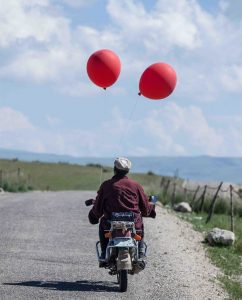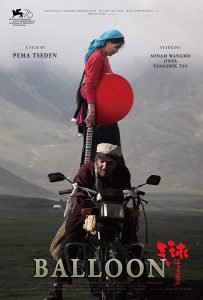“Balloon” (“Qi Qui”) (2019). Cast: Jinpa, Sonan Wangmo, Yangshik Tso, Druklha Darja, Palden Nyima, Konchok, Kunda. Director: Pema Tseden. Screenplay: Pema Tseden. Web site. Trailer.
We all value having choices in our lives, especially when they offer us a variety of pleasant outcomes. But what happens when we’re presented with options that seemingly hold no appeal, regardless of what we choose? We may feel like we have our backs up against the wall, unable to decide what to do. However, through it all, we must never lose sight of the fact that our power of choice is always with us, a paradox examined in the new Chinese cinematic fable, “Balloon” (“Qi Qui”).
In 1979, the People’s Republic of China adopted a stringent one-child policy to help control its exploding population, a social experiment that remained in place for the next 35 years (a program detailed in the excellent documentary “One Child Nation” (2019)). When the policy was implemented, families that had more than one child were allowed to stay intact, but, with very few exceptions, they were not permitted to have any more offspring. Unintended pregnancies were generally terminated through abortions followed by sterilizations. So, to help avoid such incidents, the government launched an aggressive birth control campaign through the distribution of free condoms. Unfortunately, those prophylactic items were sometimes in short supply, especially in remote areas, where they came to be treated as valuable commodities not to be squandered. And, for the Tibetan family depicted in this film, the availability of those precious contraceptives goes a long way in determining their fate.
At a time when family size is being curtailed by government mandate, Dargye (Jinpa) and his wife, Drolkar (Sonan Wangmo), are blessed to be the parents of three sons, one an adolescent away at school and two youngsters (Druklha Darja, Palden Nyima) still living at home. The children were born prior to the policy going into effect, so the family was allowed to stay together although prohibited from any more new arrivals. But mom, dad and the kids are not the only ones at home. Sharing the house with them is Dargye’s elderly father (Konchok), who helps take care of his grandsons. Their life as sheep herders in a desolate territory isn’t always easy, but this family of devout Buddhists pulls together when needed, reverently placing trust in their faith to endure whatever challenges befall them.
However, with Grandpa getting on in years, his attentiveness in caring for the little ones sometimes comes up short, and their mischievous ways land them in trouble. While rummaging through the house, the youngsters come across the last of their parents’ condoms, and they proceed to inflate them, thinking they’re balloons. Needless to say, Dargye is furious when he finds out, upset that his boys would invade their parents’ privacy as they did and then subsequently ruin what remained of mom and dad’s stash of sacred treasure. And, to make matters worse, when Drolkar visits the local health clinic to obtain more condoms, she learns that its supply is depleted. That makes things difficult for her when she returns home, where she must contend with a perpetually oversexed husband, one whose libido is about as strong as that of the rams in his flock.
[caption id="attachment_11550" align="aligncenter" width="350"] Tibetan sheep herder Dargye (Jinpa, right) and his elderly father (Konchok, second from tight) look upon disapprovingly when Dargye’s two mischievous young sons (Druklha Darja, Palden Nyima, left) inflate condoms, thinking they’re balloons, in director Pema Tseden’s new cinematic fable, “Balloon” (“Qi Qui”). Photo courtesy of Rediance.[/caption]
Tibetan sheep herder Dargye (Jinpa, right) and his elderly father (Konchok, second from tight) look upon disapprovingly when Dargye’s two mischievous young sons (Druklha Darja, Palden Nyima, left) inflate condoms, thinking they’re balloons, in director Pema Tseden’s new cinematic fable, “Balloon” (“Qi Qui”). Photo courtesy of Rediance.[/caption]
Drolkar’s circumstances become further complicated when her sister, Shangchu Drolma (Yangshik Tso), comes for a visit. Shangchu, a woman with a murky past that’s never fully explained, apparently sought sanctuary for whatever “indiscretions” she may have committed by becoming a Buddhist nun. But what should be a happy reunion is disrupted when Shangchu has a chance encounter with the young man (Kunda) who apparently was the source of her disgrace, reminding her of her past and making her visit to her sister a trying time, adding to the tension that already exists at home.
As time passes, Dargye grows ever more “anxious” that his needs aren’t being met. Drolkar wants to have her tubes tied to solve the contraceptive issue for good, but her husband can’t wait for that, coaxing her into reluctantly having sex without protection. One can only imagine what the result of that is.
Not long thereafter, tragedy strikes with Grandpa’s passing. The family dutifully follows the Buddhist death rituals, giving the patriarch a proper send-off into the afterlife. But no sooner does this happen when the family learns from religious leaders that Grandpa’s spirit is already prepared to reincarnate, making his return in the newborn growing and developing in Drolkar’s womb.
Dargye insists that the spirit of his deceased father be allowed to be reborn, but Drolkar fears what consequences await her if she carries a fourth child to term. Suddenly husband and wife are caught between the dictates of the state and the tenets of faith, a dilemma that not only pits powerful principles against one another, but that also strains the relations of a longtime loving couple. Who and what will win out? That’s what remains to be seen as this mystical and political morality play runs its course.
The story in “Balloon” is, in many ways, something straight out of Aesop, a fable riddled with irony and myriad questions in need of being answered. Principal among them, of course, is, what is one to believe about all this? That may seem simple and straightforward enough, but the answer to that question is important, for those beliefs will play a crucial role in what transpires, as they provide the basis of the conscious creation process, the philosophy that maintains we draw upon those intangible resources in manifesting the reality we each experience.
As practitioners of this philosophy are well aware, when it comes to our manifesting beliefs, we get what we concentrate upon. So, if we have multiple materializations that we’re seeking to bring into being, the ones to which we give priority are those that are most likely to appear. However, for that to happen, we must first sort out which manifestations we deem most important and focus our efforts accordingly. And, when it comes to determining the precedence of the issues facing this family, there is much to be considered, especially the order of importance.
[caption id="attachment_11551" align="aligncenter" width="275"] Tibetan sheep herder Dargye (Jinpa) makes a purchase at a local market to show his two young sons the difference between condoms and balloons in the new cinematic fable, “Balloon” (“Qi Qui”). Photo courtesy of Rediance.[/caption]
Tibetan sheep herder Dargye (Jinpa) makes a purchase at a local market to show his two young sons the difference between condoms and balloons in the new cinematic fable, “Balloon” (“Qi Qui”). Photo courtesy of Rediance.[/caption]
Decisions in this regard draw heavily from our innate power of choice. It’s something that’s always with us, even when it may not seem that way, such as when we need to decide about seemingly no-win situations. And, as this story plays out, there are numerous choice points along the way that determine our beliefs and what subsequently occurs. For example, the boys’ decision to inflate the last-remaining condoms creates the circumstances affecting their parents’ strained sex life. In turn, Dargye and Drolkar’s choice to have unprotected sex leads to the unwanted pregnancy. And that, of course, raises the matter about whether to have or abort a baby that likely contains the reincarnated spirit of Dargye’s deceased father.
At each of the junctures along the way, belief-based choices are made that lead to the resulting circumstances that follow, and, in each case, the stakes are upped when it comes to the decisions about what follows next. The seemingly mischievous acts of two little boys ultimately prove to have tremendous consequences, all of which illustrates the inherent power in our choices, our beliefs and what stems from them. Acts of creation are indeed formidable matters, regardless of how trivial or inconsequential they might initially appear.
This thus raises the question, are there any tools that we can draw upon in helping us to make decisions in situations like this? That’s a tricky one to answer, given that conscious creation essentially makes all outcomes possible. What we choose depends on a variety of factors, such as which life lessons we wish to experience, what manifestations are most likely to align with our authentic selves and core beliefs, and whether others are providing input into acts of co-creation (and how relevant that input is). Conceivably, that leaves us with much to consider, a palette of variables that can lead to a wide array of outcomes – and carry a host of consequences.
As noted above, the ante in this scenario is continually raised at each choice point. Which is why it is so critical for the participants in this story to choose wisely, doing whatever they can to consider what might result. Envisioning possibilities plays an important role in this, for it can provide us with a glimpse of what could lie ahead. And we can enhance our ability to do this by carefully examining the input that goes into our beliefs and decision-making processes. Most notably, this involves giving due regard to the primary sources of that input, our intellect and intuition. They can help to guide us in what we decide and what we believe and, by extension, what we create.
For Dargye and Drolkar, they face difficult choices about how to proceed. They must draw upon all of their metaphysical resources in determining what to do. It’s a situation in which they must look to both their consciousness and their conscience in setting their belief priorities, for what they choose will have tremendous impact with staggering ramifications. Many of us probably wouldn’t envy them for what they’re up against, but, then, most of us have likely been in comparable tight spots of our own where we were pressed with difficult choices. If so, let us hope we made the right decisions. And, if not, then we should pay attention to the experience of this couple in their ruminations about how to proceed.
The principal choice in this story – whether to adhere to the will of the state or the power of our hearts – is about as difficult a decision as any that any of us would ever have to make. Many of us might see this as a case where either choice would ultimately be unacceptable: Terminating a pregnancy to comply with the law but killing a reincarnated spirit in the process or carrying the child to term to fulfill a spiritual purpose while risking criminal sanctions and the likely murder of the baby upon birth. There may be no good outcome from either decision, but, if nothing else, such a scenario reminds us of an important truth – that we all have the power of choice at our disposal at all times and that it’s something we always need to cherish, no matter what circumstances we’re up against.
Not to be confused with the German film of the same name, “Balloon” is a paradoxical fable about what happens when spiritual beliefs collide with sociopolitical public policy. Poetically told by director Pema Tseden, with inventive and often-breathtaking cinematography, an ethereal score, and a sensitive storytelling approach, this simple but stirring tale moves viewers in heartfelt ways at both ends of the emotional scale. While the pacing is a tad sluggish in the middle (especially where Shangchu’s story is concerned), that shortcoming is easily overlooked in light of everything else this excellent film has to offer. This winner of the 2019 Chicago International Film Festival award for best screenplay has primarily been playing the festival circuit thus far, but it appears to be getting ready for general release, at least in some overseas markets. Its future for a domestic release is unclear, but, should it become available, it is well worth a look, the kind of genuinely touching tale that doesn’t make it into distribution nearly often enough.
When faced with hard choices, we may feel like there’s no way out of such difficult circumstances. However, when we make a decision to proceed, we also often find that a great weight is lifted, providing us with a tremendous sense of liberation, one that leaves us feeling renewed and perhaps even touched in an unexpectedly profound way. When that happens, we may forget all about the turmoil we went through in reaching that point – and be forever thankful that we had our power of choice to help us get there.
Copyright © 2019-20, by Brent Marchant. All rights reserved.
Tuesday, June 16, 2020
‘Balloon’ examines the beauty, and difficulty, of choice
Subscribe to:
Post Comments (Atom)

No comments:
Post a Comment